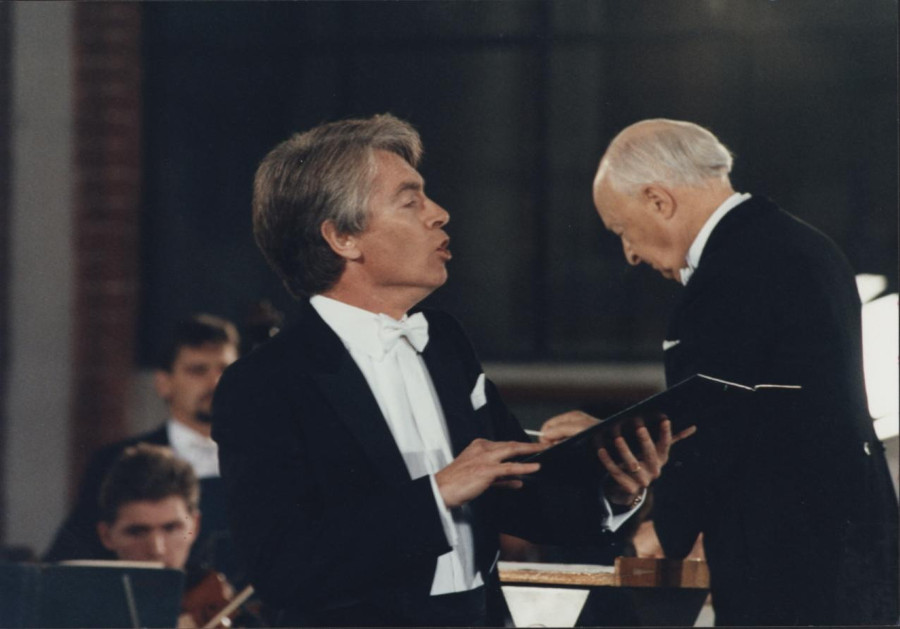A tour in Spain, successes at concerts in Germany, Midori playing a Guarneri in Wrocław – the 1990s were not so bad, although the political transformation in the world of art was very painful.
First of all, there was a lack of money and decisions about who should be responsible for individual cultural institutions.
But since Wrocław was entering a new way of life as a bankrupt city – it had a deficit of 90 billion old zlotys, and the only source of income were rents and tax on dogs – the difficulties of the Philharmonic did not find much response. Music lovers demanded a high level and were able to appreciate good concerts – Kaja Danczowska wrote in the memorial book that she played “at the end of the 1991/1992 season, again in the full hall of the Wrocław Philharmonic! – And I'm happy about it! – And thank you! – And I wish you the best for the many next seasons to come.” It was not easy, however.
Director Marek Pijarowski with great difficulty led the orchestra through the traps of the free market, he had to answer the questions of journalists and music critics, why so few stars (instrumentalists, conductors, orchestras) performed in Wrocław, but although there was not enough money to pay for the biggest names, we managed to bring many famous personalities to Wrocław.
The performance of the Japanese violinist Midori was a sensation. Her brilliant career had begun in 1982, when, as a prodigy, Zubin Mehta invited her to perform in concert with the New York Philharmonic. The audience rewarded the solo performance of the violinist with an ovation. She was only nine at the time, had previously taken violin lessons from her mother, and had just come to New York to study at the Julliard School of Music. She came to Wrocław as a star, performing on the most important stages in the world, her album with Niccolò Paganini’s Capriccios was nominated for a Grammy in 1990. She did not come alone, she brought her famous Guarneri violin from 1735, which aroused understandable emotions. Although Julian Tuwim had declared that it is “a device for tickling the inside of the ear by rubbing a horse’s tail against the bowels of a ram”, when made by a genius violin maker, this device becomes a great treasure (literally, because it costs even several million euros). And how wonderfully it tickled the ears of Wrocław music lovers ...
The audience of Alexei Sultanov’s concert, the controversial laureate of the 13th Chopin Competition (1995), was not disappointed either. He played very effectively, he was storming to the finals, the audience fell on their knees in front of him and awarded their prize. He won the Chopin Competition ex aequo with the Frenchman, Philippe Giusiano, which amazed everyone, because Sultanov trumped Giusiano with his technique and originality. They both took second place, as the first was not awarded. Sultanov did not want to receive the award because he believed that he deserved first place. And the residents of Wrocław had the opportunity to see that it was not the megalomania of the 26-year-old pianist. He earned a reputation as one of the greatest talents of the 20th-century pianism, those who heard him live may consider themselves lucky, because his career was like a meteorite flare – he died in 2005 after a long illness.
As usual, a concert by Garrick Ohlsson was a big draw, as well as performances by several winners of the Chopin Competition in 1990, including Kevin Kenner (USA). Superb violinists graced the audience: Eugen Sarbu (Romanian violinist from Great Britain), Vadim Brodsky, Grigory Zhislin and Olga Parchomienko from Russia, Murat-Ally Renat from Kyrgyzstan, Francesco Manara from Italy and Polish winners of the Henryk Wieniawski Competition – Bartłomiej Nizioł and Piotr Pławner.
String quartets visited (Modigliani, Amadeus, Dante, and the Double Bass Quartet from Austria), orchestras and choirs (Europera, The Oakland Youth Orchestra and Duquesne University Chamber Singers from the USA and the Toho Music Academy Tokyo choir from Japan). Outstanding conductors such as Antoni Wit and Jerzy Maksymiuk performed with the Wrocław Philharmonic.
But it cannot be denied that the financial problems effectively suppressed the Philharmonic’s ambitions, the belt had to be tightened more and more. At the end of the decade, the orchestra played only one concert a week, foreign stars stopped coming, and native ones performed out of sentiment. Fortunately, many felt an emotional connection with Wrocław, so music lovers had the pleasure to listen to, among others, Halina Czerny-Stefańska, Barbara Hesse-Bukowska, Piotr Paleczny, Konstanty Kulka, and Krzysztof Jabłoński.
Among the various plagues that fell on the Philharmonic in the last decade of the 20th century, there was also a flood. In 1997, the Oder overflowed rapidly, inundating Piłsudskiego Street and flooding the Philharmonic building on its way. The damage was significant, but the entire building was not only properly renovated, but also expanded, thanks to which two floors were gained and the concert hall was redecorated.
However, Director Marek Pijarowski, who ended his collaboration with Wrocław in 2001, explained in an interview with Gazeta Wyborcza that these were not the conditions for success: “The first question of conductors and soloists is: ‘What kind of venue do you have?’ ‘Seating 450,’ I answer. And they say: ‘But I’m asking about a large hall, not a small one.’ And the conversation ends there. Wrocław deserves a concert hall with 1000-1200 seats, with an organ and decent acoustics.” Another revolution was coming.
Beata Maciejewska

